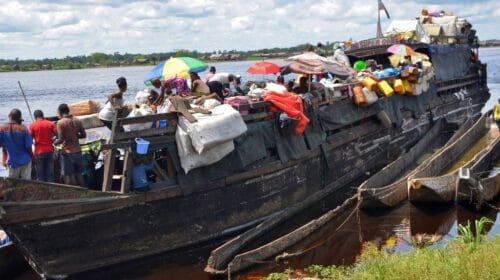Comprehensive Gender Study in Eastern Democratic Republic of Congo (DRC) for Psychosocial Support to Stop the Violence
Key findings from the report show that more than half of men surveyed report ever carrying out some form of violence against a female partner, and many men hold deeply alarming attitudes about rape and women’s rights. The study also indicates that large numbers of men are themselves victims of various forms of violence, including of sexual violence, and shows a clear association between men’s exposure to violence during childhood and increased likelihood of subsequent perpetration.
The report reveals that all forms of violence against women, including domestic and sexual violence, is underpinned by widespread acceptance of patriarchal norms and perceptions that support rape that justify and normalize rape, and the everyday subordination of women. The context of war was also found to have caused high levels of trauma amongst men, which further exaggerates levels of violence in the home. Findings also affirm just how much conflict affects families in the DRC: half or more of the men and women who had witnessed conflict lost family members, and more than three-quarters lost property.
The findings underscore how critical it is that the DRC government, UN agencies and other development partners to engage men in preventing violence against women, including by educating men and boys about women’s human rights; changing norms that fuel violence; ending impunity for sexual violence; and providing psychosocial services to the men, women and children affected by violence to stop cycles of violence at all levels of society.
Last week, Sonke Gender Justice and Promundo, together with the Embassy of Sweden, invited key government, civil society and UN stakeholders to a high-level meeting in Kinshasa to take critical steps towards reversing the normalization of violence and scaling up action to promote gender equality and changing harmful norms and behaviours. The Minister of Gender, Family, Women and Children in DRC welcomed the study and said that it will inform policy in DRC to prevent gender-based violence. The Minister also called for more studies on masculinises in DRC as well as increased work with engaging men and boys in gender equality.
Key findings include:
58% of men report ever carrying out any form of violence, including physical, sexual, psychological, or economic, against a female partner, while 65% of women report ever having experienced violence from a male partner.
While sexual violence during conflict has received far more attention than sexual violence outside of conflict, the survey confirms high degrees of rape-supportive attitudes among men affirming in many ways the perceived normality of rape. 26% of men surveyed report having committed some form of sexual violence, and nearly a third of men believe that women sometimes want to be raped and that when a woman is raped, she may enjoy it. Nearly half of the men surveyed think that if a woman does not physically resist when forced to have sex, it is not rape, and, disturbingly, given the very high levels of rape in war, more than 40% of men said that a man should reject his wife if she has been raped.
Men are found to not just be perpetrators of violence, but also victims of violence, and deeply affected by the consequences of war.
10% of all men and 22% of all women surveyed report being forced to have sex or being raped during the conflict. Furthermore, 10% of civilians and 26% of former combatants report witnessing a rape carried out by others.
Witnessing violence by men against their mothers when they were children was associated with men’s use of physical violence against female partners. Unemployment, alcohol consumption, and less equitable gender attitudes are also significantly associated with men’s perpetration of violence.
The results reveal high levels of poverty, including that hunger is an all too common daily reality for respondents; 57% of men and 60% of women eat only one meal a day or less.
In addition to material hardship and hunger, the effects of lack of work and not having enough money to provide for their families are a source of tremendous stress for men and women. Men often feel ashamed and depressed when they are not able to sustain their families; 73% of men and 82% of women were ashamed to face their families because they couldn’t provide basic financial needs; and 76% of men and 79% of women are frequently stressed or depressed because they do not have work.
About IMAGES
The International Men and Gender Equality Survey – developed and coordinated by Promundo and the International Centre for Research on Women – is one of the most comprehensive studies ever conducted on men’s practices and attitudes, and women’s reports of men’s practices and attitudes, as they relate to gender equality, household dynamics, intimate partner violence, health and economic stress. The study has been carried out in ten countries (including this study in DRC) with additional partner studies in Asia. The data is providing insights on men’s use of violence against partners, participation in care giving, and men’s reactions to the global gender equality agenda, among other themes. Learn more here:
http://genderjustice.org.za/updates/highlights/2001455-new-preliminary-results-from-sonke-promundo-images-survey.html
About Sonke Gender Justice
Sonke is a South African-based NGO that works across Africa to strengthen government, civil society and citizen capacity to promote gender equality, prevent domestic and sexual violence, and reduce the spread and impact of HIV and Aids. Sonke endeavours to create the change necessary for all to enjoy equitable, healthy and happy relationships that contribute to the development of just and democratic societies. Sonke’s work has won many national and international awards and has been featured as an example of global best practice by many UN agencies and women’s rights organisations.
www.genderjustice.org.za
About Promundo
Founded in Rio de Janeiro, Brazil in 1997, Promundo works internationally to promote caring, non-violent and equitable masculinities and gender relations internationally. Promundo’s independently registered organizations in Brazil and the United States and its representatives in Rwanda collaborate to achieve this mission by conducting research to build the knowledge base on masculinities and gender equality; developing, evaluating and scaling up gender transformative interventions and programs; and carrying out national and international advocacy to achieve gender equality and social justice.
www.promundo.org.br/en
END
###
For more information, Contact;
Dean Peacock/Tim Shand,
Sonke Gender Justice Network,
Cape Town, South Africa, +27-21-423-7088
Gary Barker, Promundo-US
Washington, DC, USA,
+1 202-588-0061



